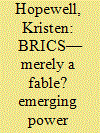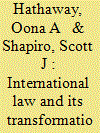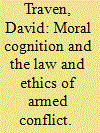|
|
|
Sort Order |
|
|
|
Items / Page
|
|
|
|
|
|
|
| Srl | Item |
| 1 |
ID:
157973


|
|
|
|
|
| Summary/Abstract |
The much hyped rise of the BRICS (Brazil, Russia, India, China and South Africa) has lately been met with equally fervent declarations of their demise. Amid slowing growth in many of these countries, the prevailing view now appears to be that the rise of the BRICS was little more than an illusion. In this article, however, I contest this assessment by arguing that the emerging powers were never solely, nor most importantly, merely an economic phenomenon. Instead, I show that emerging powers—specifically Brazil, India and China—have become an important political force in the global trading system and have had a profound and lasting impact on the World Trade Organization (WTO). Contrary to the widespread assumption that these countries are too diverse to ally, I argue that the emerging powers displayed a remarkable degree of unity and cooperation, working in close concert to successfully challenge the dominance of the US and other established powers. As evidenced by the collapse of the Doha Round, the collective rise of Brazil, India and China substantially disrupted the functioning of one of the core institutions of the liberal economic order created under US hegemony.
|
|
|
|
|
|
|
|
|
|
|
|
|
|
|
|
| 2 |
ID:
165030


|
|
|
|
|
| Summary/Abstract |
The First World War was the last great war of what we have called the ‘old world order’—the legal regime that European states adopted in the seventeenth century and spent the next three centuries imposing on the rest of the globe. This order formed the basis of what scholars call ‘classical international law’. But this body of rules differed starkly from the ones that govern today: the old world order did not just sanction war, it relied on and rewarded it. States were permitted to wage war to right any legal wrong, and the right of the victors to extract territory and treasure from the losers was legally guaranteed. That all began to change when the nations of the world decided to outlaw war in the 1928 Kellogg–Briand treaty. As a result, the rules governing international behaviour have transformed radically—indeed, they are the polar opposite of what they once were. This article describes the decision to outlaw war and the transformation it unleashed in the world order generally, and in international law specifically. We argue that a simple but perplexing fact—that modern international law prohibits states from using force to enforce international law—is key to understanding international law and state behavior in the modern era.
|
|
|
|
|
|
|
|
|
|
|
|
|
|
|
|
| 3 |
ID:
145711


|
|
|
|
|
| Summary/Abstract |
In contemporary political science, many believe that normative restrictions on armed conflict are an outgrowth of Western culture and the just war tradition. Drawing on historical evidence, which shows that political actors in Ancient China and the early Islamic empire endorsed civilian protection rules, I claim that such norms are more common than most International Relations (IR) theorists suppose. For IR theory, this raises an important puzzle: How can we explain why similar normative ideas emerged in human societies that are otherwise very different? Building on research in cognitive science, social psychology, and social neuroscience, I argue that most people have natural cognitive and emotional predispositions that bias the emergence and transmission of cultural norms that protect non-combatants. More specifically, capacities for perspective-taking and empathy shape how people interpret the limits of their moral commitments, and when these capacities are engaged, intuitional heuristics affect how they judge the morality of killing in war. What is more, I claim that three key contextual variables moderate the connection between innate moral intuitions and the development of civilian protection norms: (i) societal interdependence, (ii) the social empowerment of marginal actors, and (iii) the creation of norms in argumentative contexts that require impartial moral reasoning. I argue that rationalist and constructivist theories of norm emergence will be able to better explain the emergence, the durability, and the institutional design of the norms of war by incorporating this naturalistic theory of moral cognition.
|
|
|
|
|
|
|
|
|
|
|
|
|
|
|
|
| 4 |
ID:
165029


|
|
|
|
|
| Summary/Abstract |
Several of the world's intergovernmental organizations have now existed for longer than many nation-states. The centenary of the peacemaking that ended the First World War offers the opportunity of making good policy use of new histories that inform us about the shifting horizon of international expectations, the social dimensions of international thinking and international political cultures, their nation-state roots, and the sum of this relatively marginalized international past. The aim of this article is to draw together the various strands of the new historical work undertaken in the last decade in order to orientate 1919 as a moment that launched the world into a century of often profound discussion about international organizations as necessary instruments of multilateralism. This discussion sometimes dwindled, and it did not prevent wars. However, it had significant impacts: from the spectrum of ideas it brought to bear on the question of how to solve the world's most serious problems, to the practices of international governance it helped introduce. As importantly, the international order shaped in 1919 created unprecedented political spaces for representing the diverse interests of the world's populations, even the stateless. At crucial moments in the twentieth century, world-scale solutions to world-scale problems gave people ideas—even when the window of opportunity was small. If this history is good for anything, I argue that it might be for orientating our present in relation to that international past, and how we begin to imagine the future of the international order, as we know it.
|
|
|
|
|
|
|
|
|
|
|
|
|
|
|
|
|
|
|
|
|